Hey there, brave adventurers (and their equally brave parents)! So, you’re thinking of Australia, huh? Maybe you’re picturing kangaroos hopping around the Sydney Opera House or daydreaming about Melbourne’s coffee shops.
But what if I told you there’s a whole other side to Australia that’s like the bonus level in a video game?
A place where the air smells like… well, air, and where every local seems to know everyone else (and soon, you!). For the students ready to dive into a new chapter, and the parents biting their nails at home, let’s take a detour off the most common path and venture into the heart of regional Australia.
Trust me; it’s like finding a secret garden in your own backyard!
The Undiscovered Charm of Regional Australia
Now, I know what you’re thinking. “Why would I go regional when I can be in the heart of Sydney?” But bear with me. Regional Australia is like that book on your shelf you’ve never read, only to discover it’s a hidden gem. From the serene landscapes of the Barossa Valley to the coastal beauty of Townsville, there’s a slice of authentic Australia waiting for you.
Benefits of Studying at Regional Institutions
Beyond the scenic beauty, regional institutions pack a punch in the education department. Think about it:
Wallet-Friendly Living Costs
Let’s start with the allure of affordability. While Sydney and Melbourne might be Australia’s flashy stars, regional towns offer a refreshing escape from high living expenses. Think lower rent, budget-friendly meals, and more bang for your Aussie buck. The result? Extra savings to send home or invest in your future.
So Many Scholarships
Regional institutions are the Robin Hoods of education, generously offering scholarships and financial aid. These institutions often have a treasure trove of grants available for international students. This not only eases the tuition fee burden but also makes education more accessible.
Plenty of Part-Time Work Opportunities
International students in Australia can work part-time during their studies, and regional areas offer a goldmine of job opportunities. With a higher demand for part-time workers, you’ll find it easier to secure a gig. That means more cash to fund your Aussie adventures and stash away for later.
Post-Study Work Paradise
Upon graduation, regional Australia extends a golden opportunity: the Post-Study Work Visa (subclass 485). This visa allows you to work in the country for a duration that aligns with your level of study. Working in regional areas adds valuable experience to your resume, boosting your career prospects.
Personalised Learning Experiences
In regional institutions, smaller class sizes create a close-knit learning environment. Professors actually know your name, fostering stronger academic relationships. They’re not just educators; they’re mentors who offer guidance, mentorship, and even research opportunities, enriching your education.
Quality of Life
Life in regional towns offers a refreshing change of pace. Cleaner air, less traffic, and a tight-knit community contribute to a high quality of life. It’s a place where work-life balance isn’t just a buzzword; it’s a way of life, reducing stress and enhancing overall well-being. Also, regional Australia showcases Mother Nature’s finest creations. Pristine beaches, lush forests, and rugged outback landscapes await your exploration. Outdoor adventures abound, offering relaxation and entertainment that won’t break the bank.
Your Gateway to Industry Success
Regional institutions often have deep connections with local industries. This translates into abundant internship and job opportunities. Real-world experience gained in these areas enhances your employability, fast-tracking your career dreams.
Also Read: Why Study in Australia? Top 10 Tips You Need to Watch Out
Visa Incentives for Regional Study
It’s not just about hitting the books; it’s about reaping the rewards of a visa programme that can open doors you never knew existed. So, throw on your cork hat, and let’s explore this golden ticket to your Australian dreams!
Post-Study Work Opportunities That Sparkle
First things first, let’s talk about the glittering gem in the visa crown – the Post-Study Work Visa (subclass 485). Regional study gives you an edge here. If you choose to complete your studies in a regional area, you can benefit from extended post-study work rights.
- Graduate Work Stream (Subclass 485): If you graduate from a regional institution and work in a regional area, you can enjoy a post-study work visa for up to three years. That’s a fantastic opportunity to gain valuable work experience and perhaps even transition into a permanent residency pathway.
Extra Points for Skilled Migration
For those of you with dreams of settling permanently, regional study offers an extra slice of the immigration pie. Australia’s point-based immigration system rewards regional study with additional points. These points can significantly boost your chances of securing a skilled migration visa.
Access to the Regional Sponsored Migration Scheme (RSMS)
Regional study can also pave the way for the Regional Sponsored Migration Scheme (RSMS). Some regional employers are eager to sponsor skilled workers, and if you’ve already studied in a regional area, you might find yourself in the prime position to secure a job and sponsorship.
Pathways to Permanent Residency
Australia values international students who contribute to the growth of regional areas. By studying in a designated regional area, you may be eligible to apply for regional visas that can lead to permanent residency. These visas, such as the Skilled Regional (subclass 887) and the Regional Sponsored Migration Scheme (subclass 187), offer pathways to call Australia your forever home.
Simpler Eligibility Criteria
Regional visas often come with more relaxed eligibility criteria compared to their non-regional counterparts. This means you might find it easier to meet the requirements and secure your visa, bringing you one step closer to achieving your Australian dreams.
Also Read: Everything you should know about Study Visa for Australia
Job Opportunities in Regional Areas
“But what about jobs?” I hear you ask. Fear not! Regional Australia isn’t just about farms and vineyards; it’s a land of diverse job opportunities.
From healthcare to education, tourism to agriculture, regional areas offer a wide range of career choices. You might discover your dream job in a place you least expected.
Healthcare
If you’re in the healthcare sector, regional areas are like fertile soil for your career to grow. Rural and remote regions often have a higher demand for healthcare professionals. Doctors, nurses, pharmacists, and allied health workers are in high demand. Plus, the satisfaction of making a difference in underserved communities is priceless.
Education
Regional schools and universities are always on the lookout for talented educators. Whether you’re a teacher, lecturer, or education administrator, you’ll find opportunities to inspire the next generation. Smaller class sizes also mean a more intimate teaching experience.
Hospitality and Tourism
If you’ve got a knack for hospitality or a passion for tourism, regional Australia is your playground. Hotels, restaurants, wineries, and adventure tourism businesses thrive in these areas. Imagine working at a picturesque winery, serving guests against a backdrop of rolling vineyards.
Agriculture and Agribusiness
Australia’s agricultural heartland resides in its regional areas. Jobs in agriculture, agribusiness, and agtech are abundant. You could be involved in anything from crop management to sustainable farming practices or even agribusiness consultancy.
Mining and Resources
Resource-rich regions offer excellent opportunities in mining, energy, and resources. Engineers, geologists, and project managers are highly sought after. It’s a chance to be part of essential industries that drive Australia’s economy.
Environmental Conservation
Regional Australia’s stunning natural landscapes need passionate environmentalists. If you’re into conservation, you can work with local organisations to protect native flora and fauna. It’s a rewarding way to combine your passion with your profession.
Community Services
Social workers, counsellors, and community service professionals are in demand to support regional communities. You’ll play a crucial role in addressing social issues and enhancing the well-being of local residents.
Manufacturing and Trades
Don’t overlook regional manufacturing and trades. Electricians, plumbers, and mechanics are essential to keep regional towns running smoothly. It’s steady work with a strong sense of community.
Small Business Opportunities
Regional areas are fertile grounds for budding entrepreneurs. Lower overhead costs and a supportive community make it an ideal place to start your own business. Whether it’s a cosy café or an eco-friendly boutique, your dreams can flourish here.
In smaller communities, building professional networks is easier than navigating a bustling city. Locals are often more approachable, making it simpler to forge meaningful connections. Your colleagues could become lifelong friends and mentors. So, with fewer layers of bureaucracy, you’ll have more opportunities for career advancement. Your contributions are more visible, and you can make a real impact on your organisation. Make the smart choice!
Building Stronger Community Connections
In regional Australia, it’s not just about the studies; it’s about becoming part of a community. Unlike the vast expanse of major cities where it’s easy to feel lost, regional areas offer a close-knit environment. Here, networking isn’t just a formal event; it’s a daily activity.
Be it a chat at the local café, a community event, or a weekend farmer’s market – every interaction is an opportunity to connect. The support from locals, the cultural immersion, and the genuine friendships forged in these areas are unparalleled.
Challenges and How to Overcome Them
Life in regional Australia is like a dance. Sometimes, you waltz gracefully, and other times, you stumble over the steps. But hey, every dance has its tricky moves, right? Let’s go through some challenges as well and find our rhythm.
The “Where’s My Favourite Food?” Dilemma
Miss the taste of home? While regional areas might not have a plethora of international restaurants, it’s a chance to get creative in the kitchen. Host potluck dinners or explore local delicacies. Who knows? You might discover a new favourite!
The FOMO (Fear of Missing Out)
Yes, big cities have big concerts, big events, and big attractions. But regional areas have their own charm. Swap the concert for a local music gig or the mall for a charming farmer’s market.
Adapting to the Pace
Regional life is often slower, more laid-back. Initially, it might feel like you’ve hit the pause button. But embrace it! Use the extra time to explore, reflect, and truly immerse yourself in the experience.
Building a Support System
Being away from family and familiar faces can be tough. But remember, regional communities are known for their warmth. Attend local events, join groups, and soon, you’ll have a support system that feels like family.
Navigating Limited Resources
Limited public transport? Fewer shopping options? See it as an adventure. Carpool with friends, explore local boutiques, and discover the joy of simplicity.
OK, here’s the deal, students (and sneaky parents reading behind your backs): The remote areas of Australia are like the film you were initially sceptical about but ended up adoring.
It’s not just about the degree; it’s about the memories you’ll cherish forever, the people you’ll meet for the rest of your life, and maybe even a kangaroo or two.
For those already in Australia, thinking of switching things up, remember: life’s too short for “what ifs.” Sometimes, the best treasures are found when you venture off the main road.
So, whether you’re lacing up your adventure boots for the first time or looking for a new path, regional Australia is waving at you with a cheeky grin, saying, “Bet you didn’t expect to find me here!”
Also Read: Top 5 Best Cities to Study, Live, and Work in Australia for International Students
Need Help with Australia’s Migration Stuff? There’s an App for That!
Ever felt lost with all the visa and migration rules for Australia? Don’t worry; we’ve got something to help! OccuSearch is like a friendly guide that explains everything in simple terms. No jargon, no confusion.
It tells you about visa rules, how much things might cost, and even checks if you’re on the right track. It’s like a mini-helper for all your Australia plans!
Want to make things easy? Tap here and get OccuSearch on your phone!
From Enrolment to Graduation: How the ESOS Act Protects International Students in Australia
Australia stands out as a top choice for international education, drawing students from all corners of the globe.
For many parents and guardians, sending their child to study in Australia is a big decision, filled with hopes and concerns. They often wonder: Will my child get the best education? Will they be safe and supported?
Addressing these concerns, the Education Services for Overseas Students Act of 2000 (ESOS Act) was passed to help international students.
This crucial piece of legislation ensures that Australia remains a trusted and top-quality destination as the rights of international students are significantly protected by this law.
So, let’s go deeper into the ESOS Act to get a better grasp of it.
What is the ESOS Act?
The Education Services for Overseas Students Act 2000 (ESOS Act) is a piece of Australian legislation that sets out the legal framework governing the delivery of education to international students in Australia on a student visa.
The primary aim of the ESOS Act is to uphold the reputation of Australia as a premier destination for international education by ensuring consistent standards of practice among education providers.
Also Read: Everything you should know about Study Visa for Australia
Key Provisions of the ESOS Act
Protection of Student Fees
One of the primary concerns for international students is the security of their tuition fees. The ESOS Act addresses this by:
- Ensuring institutions provide clear and transparent information about tuition and other fees.
- Mandating that institutions can only collect a maximum of 50% of the tuition fees before the student commences the course.
- Ensuring that students are protected from potential financial losses.
Tuition Protection Service (TPS)
The TPS acts as a financial safety nett for international students. In the event that an institution cannot deliver the course a student has paid for, the TPS steps in. It ensures that:
- Students can either complete their studies in another course or with another education provider.
- Students receive a refund of their unspent tuition fees.
National Code of Practice
The ESOS Act established the National Code of Practice for Providers of Education and Training to Overseas Students. This code:
- Sets consistent national standards to protect international students.
- Ensures that institutions provide accurate information to students and maintain high standards of education.
CRICOS Registration
To ensure that international students receive quality education:
- Only institutions registered on the Commonwealth Register of Institutions and Courses for Overseas Students (CRICOS) can enrol international students.
- This registration ensures that institutions meet the necessary standards for education, facilities, and marketing.
Student Rights and Well-Being
The ESOS Act ensures that:
- Students are well-informed about their courses, including the mode of study, course duration, and any prerequisites.
- Institutions provide support services to help students adjust to life and study in Australia.
- Institutions have measures in place to ensure the safety and well-being of younger students under the age of 18.
Monitoring Compliance
To ensure that education providers uphold the standards set by the ESOS Act:
- The Australian government has the authority to monitor education providers.
- This includes conducting audits, imposing sanctions, or even prosecuting providers that fail to meet their obligations.
Provider Transfer Restrictions
The ESOS Act ensures that students are not enticed to change providers by restricting transfers within the first six months of a principal course, ensuring students make informed decisions about their education journey.
Also Read: The Rising Trend: How International Students are Bridging the Skill Gap for Australia
Why is the ESOS Act Important for International Students?
The ESOS Act is more than just a piece of legislation; it’s a commitment from the Australian government to international students. Here’s why it’s crucial:
Quality Assurance
The ESOS Act is a testament to Australia’s commitment to delivering high-quality education to all students, including those from overseas. It ensures that:
- Institutions provide accurate and transparent information about courses, fees, and other essential details.
- Only institutions that meet rigorous standards can enrol international students, ensuring a consistent level of quality across the board.
Financial Security
Studying abroad is a significant investment, and the ESOS Act provides international students with peace of mind regarding their finances. Key provisions include:
- Limiting the upfront fees that institutions can charge.
- The establishment of the Tuition Protection Service (TPS), which acts as a safety nett, ensuring students can either continue their studies or receive a refund if their chosen institution can no longer provide their course.
Protection of Student Rights
The ESOS Act goes beyond academics, ensuring that international students’ rights are protected in various areas, including:
- Accurate marketing and representation of courses.
- Transparent and fair refund policies.
- Adequate support services needed to help students adjust to life and study in Australia.
Ensuring Student Well-Being
For many international students, studying in Australia might be their first time away from home. The ESOS Act ensures that:
- Institutions provide support services, from academic assistance to mental health resources.
- There are measures in place to ensure the safety and well-being of younger students under the age of 18.
Monitoring and Compliance
The ESOS Act isn’t just a set of guidelines; it has teeth. The Australian government actively monitors institutions to ensure they comply with the Act. This includes:
- Regular audits of educational providers.
- The potential for sanctions or even legal action against institutions that fail to meet their obligations.
Empowering Informed Decisions
The ESOS Act ensures that students have all the information they need to make informed decisions about their education in Australia. This includes:
- Clear information about courses, including duration, mode of study, and prerequisites.
- Transparent fee structures and refund policies.
Also Read: Everything you should know about Study Visa for Australia
In Conclusion
Choosing to study abroad is a life-changing decision, and Australia promises an experience that’s both rewarding and secure.
For international students, it’s about more than just academics; it’s about feeling safe, respected, and valued. The ESOS Act is Australia’s commitment to delivering on this promise.
Parents and students can rest assured that, in Australia, student welfare and quality education go hand in hand. With the ESOS Act in place, Australia continues to shine as a premier global education hub, offering both world-class courses and a protective environment for its international student community.
Navigating Your Australian Dream with Aussizz Group
While the ESOS Act lays the foundation for a secure and enriching educational journey in Australia, we understand that the path to studying abroad comes with its own set of challenges and questions. That’s where Aussizz Group steps in.
Imagine us as your friendly compass in the vast landscape of Australian education. With branches in every state, we’re your local guide, ready to simplify the complexities, answer the tricky questions, and ensure your Australian adventure is smooth sailing.
From understanding the nuances of the ESOS Act to finding the perfect university or course, and even settling into a new city – we’re with you at every twist and turn. And for the parents out there, we’re your eyes and ears on the ground, ensuring your child’s well-being and success.
So, as you embark on this exciting chapter, remember that you’re not alone. With Aussizz Group by your side, your Australian dream is not just a possibility; it’s a promise. Reach out to us and let’s turn that dream into reality, together!
Australia, with its world-class education system, diverse culture, and impeccable natural beauty, has emerged as a top destination for international students. The country’s top cities offer a blend of academic excellence, job opportunities, and an unparalleled quality of life. These cities not only house some of the world’s best universities but also provide a vibrant cultural scene, making them ideal for studying, living, and working.
- Sydney
- The Harbour City with Endless Opportunities
- Top Colleges:
- University of Sydney
- University of New South Wales
- Macquarie University
- Famous Things:
- Sydney Opera House
- Sydney Harbour Bridge
- Bondi Beach
- Why Sydney? Sydney, being the largest city in Australia, offers a plethora of job opportunities in various sectors. Its diverse culture and iconic landmarks make it a favourite among international students. The city’s robust public transportation system and cosmopolitan lifestyle make it a perfect place to live and work.
- Top Features:
- Bustling city life with a mix of nature
- Multicultural communities
- Numerous festivals and events occur throughout the year.
- Top Colleges:
Also Read: Australian Study: Why it is Essential to Pursue Vocational Courses
2. Melbourne
- The Cultural Capital with a Flair for Arts
- Top Colleges:
- University of Melbourne
- Monash University
- RMIT University
- Famous Things:
- Melbourne Cricket Ground
- Royal Botanic Gardens
- National Gallery of Victoria
- Why Melbourne? Known for its art, music, and theatre scenes, Melbourne provides a rich cultural experience. The city boasts a strong economy, making it a hub for job seekers. Its student-friendly environment and diverse population make it a top choice for international students.
- Top Features:
- Renowned coffee culture
- Thriving arts and music scene
- Excellent public transport
- Top Colleges:
- Brisbane
- The Sunlit City with a Warm Welcome
- Top Colleges:
- University of Queensland
- Queensland University of Technology
- Griffith University
- Famous Things:
- South Bank Parklands
- Brisbane River
- Lone Pine Koala Sanctuary
- Why Brisbane? With its warm climate and friendly locals, Brisbane offers a unique Australian experience. The city’s growing industries provide ample job opportunities, and its affordable living costs make it attractive to students.
- Top Features:
- Vibrant nightlife and entertainment
- Close proximity to famous beaches
- Thriving business district
- Top Colleges:
- Adelaide
- The Coastal Beauty with a Relaxed Pace
- Top Colleges:
- University of Adelaide
- Flinders University
- University of South Australia
- Famous Things:
- Adelaide Oval
- Adelaide Zoo
- Barossa Valley
- Why Adelaide? Adelaide’s serene beaches and laid-back lifestyle make it a peaceful place to study and live. The city offers a balanced life with its cultural events, parks, and job opportunities in various sectors.
- Top Features:
- Rich wine regions
- Festivals and events throughout the year
- Affordable living costs
- Top Colleges:
Also Read: The Top 5 In-Demand Trade Courses in Australia for 2023
- Perth
- The Western Gem with a Golden Touch
- Top Colleges:
- University of Western Australia
- Curtin University
- Edith Cowan University
- Famous Things:
- Kings Park and Botanic Garden
- Perth Mint
- Cottesloe Beach
- Why Perth? Perth’s booming economy, especially in the mining sector, offers numerous job opportunities. It’s pristine beaches and outdoor activities make it a favourite among students seeking a balance between studies and leisure.
- Top Features:
- Warm and sunny climate
- Growing tech and startup scenes
- Proximity to Asia, offering diverse cultural experiences
- Top Colleges:
Also Read: Why Choose Australia for Your Higher Studies and Why Now?
Conclusion: Choosing the right city in Australia for your studies and future can be a daunting task. However, with the guidance of the Aussizz Group, a leading visa and immigration consultant with 30+ branches in Australia, the journey becomes smoother. With 50+ RMA agents, they are just a message or call away, ensuring that international students make informed decisions and enjoy a seamless transition to Australian life. Get in touch with us TODAY
Australia is an exotic and beautiful nation! It’s a dream for many to live and work in this country!
There are many benefits for working and living in Australia! Who doesn’t like Lash greeneries, hills or lovely beaches to wake up! It’s a nation where individuals are also very friendly! So socializing in Kangaroos country becomes simple!
If you have been given an opportunity to migrate to Australia with your family members, you’d probably be working by the sweat of your brow to make the most out of this.
You desperately want the department of immigration to give your visa a green signal, so go through the criteria carefully to make sure you have all the documents you need to apply for the visa.

Wait… health insurance cover!!!
I am young and healthy. Why do I need that? You ask with uncertainty!
Well, more often applicants face delay in their visa processing as they fail to submit some crucial documents.
An adequate level of Overseas Visitor Health Cover (OVHC) is one of them.
All the temporary visas of Australia are subject to 8501 condition, which require an applicant along with the accompanying family members to have health insurance for the entire duration of stay in Australia. It assures a hassle-free access to Medicare (a publicly funded universal health care system in Australia) services during any of the following situations.
Health Deterioration Due to Unsuitable Weather
Weather is the most important factor that many immigrants overlook when moving to a different country. Australia’s climate is as diverse as its culture. The country has been labelled as one of the most vulnerable one to climate change due to high importance of its agriculture sector and prominence of its coast.
The changing climate can have significant repercussions on health like high blood pressure, headaches & migraines, asthma, eczema, and sometimes heart attacks and stroke too. This is where the benefits of having a health insurance can be clearly seen. It typically pays 80 to 90 percent of the costs after the deductible has been reached.
Injury due to accident
Accidents can happen to anyone. They are unanticipated and often result in severe injuries. This cause huge hospitalisation expenses be it private or public hospital along with corresponding medical bills. With an appropriate health insurance cover, you are not only backed against such bills but also get saved from financial hardships.

Dental emergencies
Imagine how irritating or upsetting it can be when something as small as a fragmented tooth can literally force you to book your return flight for treatment. All because you cannot afford the costs of the treatment in Australia. Having the dental emergency covered in your policy means you can continue to enjoy pain-free stay in Australia whilst getting quality treatment by the specialists.
Epilogue
With the exponential increase in healthcare costs, having health insurance that can support you in the long run is essential. So, before you rush to buy a plan, why not compare multiple health insurance options from leading providers like Bupa, NIB, AIA, Medibank, and Allianz Care to choose the one that best fits your budget and visa requirements?
Read More: Common Insurance Terms You Should Know: Overseas Health Cover
At Getmypolicy.online, purchase the best health cover in less than 5 minutes by comparing a wide range of insurance policies on different parameters including:
- Doctor Services
- Accommodation
- Prescription Medicine
- Accident & Emergency Services
- Emergency Ambulance Services
- Out of hospital medicines
- In-patient psychiatric, rehabilitation and palliative care
You’d probably start wondering there must be some hidden catch, right?
But there’s not. It’s completely authentic and unbiased. Plus, the buying process is so simplified and there’s a guaranteed saving on investment.
Visit now and start exploring plans today!
So, you’re planning to start a new chapter of your life in Australia whether as a visit or a business trip or to study, and you’re planning to buy the best Overseas Health Insurance plan for you and your family, but
Do you know what a waiting period is?
Do you know what pre-existing conditions are?
How are pre-existing conditions assessed?
Why are there waiting periods?
What are the things to remember while buying an insurance plan?
So scroll down below to get the right information before you go on to buy the best Overseas Health Insurance Plans.
What is a Pre-existing Condition?
A pre-existing condition is an illness, an ailment or a condition of which you exhibit symptoms or signs of, before you got insured by the insurance policy, which can affect your health or your ability to work. There is no necessity for a diagnosis in this case. The pre-existing condition is determined in the opinion of the medical practitioner, appointed by the Health Insurance Provider, of any signs or symptoms which are reasonably evident to be prevailing since Six months before you are insured.
The pre-existing conditions can be life-threatening illnesses such as cancer, diabetes, stroke or it can be less threatening like High Blood Pressure, Asthma or a joint injury.

What means as a “Waiting Period” for Pre-existing Conditions?
A “Waiting Period” is a time where the insured person has to wait for a certain period before they can claim from their Health Insurance. Usually, a Health Insurer may impose 12 months before any benefits can be claimed by the insured. The Waiting Period usually starts from the day you arrive in Australia or from the day your visa is granted- whichever is more recent. You typically have to wait for 12 months before claiming any benefits for any Pre-existing Conditions, 12 months for Pregnancy and 2 months for palliative care, psychiatric care, or rehabilitation.

Why is there a Waiting Period?
The Waiting period is not for denying Healthcare access to anyone; instead it is to protect Health Insurers and other members of the Healthcare funds. If there are no Waiting periods, anyone can take out a health cover or upgrade their cover only when they know or have a suspicion that they would need that health cover. They will then reap all the benefits from the cover, then cease the cover or downgrade their current cover to a lower level policy, which results in substantial Hospital bills which then have to be paid by the long-term members on that policy. This would be extremely unfair to the long-term members. Once you serve the Waiting Period and become a long-term member, then you don’t have to pay excessively for those who get in and out of the hospital at their leisure. You can also then claim benefits from your Health Insurance provider after you serve the “Waiting period.”

In case you’re planning to switch between health insurance policies, your Waiting Period will be carried over, and you don’t have to re-serve the Waiting Period that you already served. But if you’re switching to higher-grade Health policy, then you will have to serve the Waiting period before claiming any benefits that your previous plan didn’t offer.
Must Read: Most Important Terms to Consider for Australia Health Insurance Plan
Remember that an Overseas Health Insurance Cover may vary from one insurer to another. The terms and conditions, as well as the Waiting Period of one insurance providers, differs from the other. Also, never hide your pre-existing condition which you have at the time of Health Inspection.
It is also the medical practitioner appointed by the Health Insurers who decides whether you have a pre-existing ailment, illness or a condition and not your current treating doctor. The medical practitioner will also see that if there is a connection between the illness, ailment, or a condition to the policy the insurer is going to avail.
For the holders of Overseas Visitor Health Cover and Overseas Student Health Cover, you should always check with your Insurance providers as to which benefits they provide, their terms and conditions, the Waiting period in that Health Insurance Policy. For more detailed information, visit GetMyPolicy.online. Compare and buy from their most extensive range of insurance policies. Choose any cover type and for any Visa for Australia, and have a safe and carefree trip in Australia.
If you’re an international student planning to visit Australia, then arranging an Overseas Student Health Cover is very crucial for your Visa process.
According to the Department of Home Affairs (DHA), the 8501 condition of the Student Visa (subclass 500) states that “The visa holder must maintain adequate arrangements for health insurance during their stay in Australia.”
The OSHC Plan commences the day you arrive in Australia and you are insured throughout your entire course time in Australia.
The OSHC Plan in general covers:
- In & Out of hospital medical treatment
- Emergency ambulance assistance
- Prescription Medicines
- Treatment at Private Hospitals
- Medical Surgeries
- In-patient Psychiatric
- Palliative Care
- 100% of MBS fee for services like surgery or extended care for an illness
- 24×7 Emergency assistance
|
* The services can vary depending on the different providers and the price range. * |
Remember: Once you arrive in Australia, it is necessary that you activate and order your Membership card from your Insurance Provider.
After receiving your card, always check the details on the card. It must match your details on the student visa.
In case of a mismatch, you must contact the respective insurance provider for the same.
You need your OSHC Membership card when:
- You need to visit a doctor
- You need to arrange admission to hospital
- You need to make a claim or make any other type of enquiry.
Your membership card will have your Insurance Membership number. If you are to use any OSHC Benefits at any of the medical service provider, you will have to show them your membership card.
Always keep your card SAFE, keep it in your wallet or somewhere close to you in time of need.
You are responsible for any claims that are made by your card.
If it gets lost, stolen or someone not covered by your OSHC plan is using your card- Inform your Insurance Provider immediately.
You can either activate the e-membership card or order the physical copy of the card as per the available option from your insurance provider.
Ahm, Medibank and Allianz Global Assistance offers e-membership card activation which you will receive via an e-mail. You can save this e-card in your phone and show when needed. If you want a Physical copy of the card, you can request your Insurance provider to send you the physical copy on your Australian address. You will receive the card within 10 days.
Insurance Providers like BUPA and NIB offers only Physical Cards.
Allianz Care Membership Card:
If your Insurance Provider is Allianz Care then on arriving in Australia, you can activate and order membership card by Allianz Global Assistance My OSHC Assistant App or from student membership Portal.
Just update your Australian address and contact number and get request for access of the membership card.
You can also get access of E membership card instantly from My OSHC Assistant App. Save it in your phone for easy access.
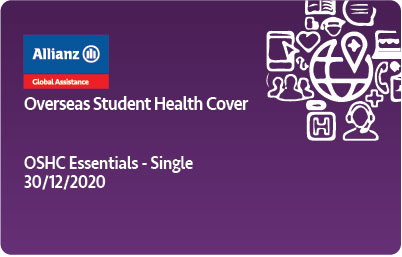
Medibank Membership Card:
You can get your Medibank e-membership card by going online on medibankoshc.com.au and complete your registration by updating the personal details asked of you on the website.
Save the digital card in your phone to keep it handy.
In case you want to order a Physical Membership card, just visit “ORDER DARD” option from your membership account
Or
Call Medibank at 134148 to update your Australian address and contact details to claim the physical card.
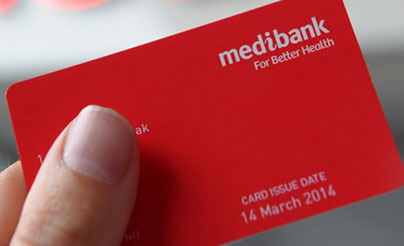
Bupa Membership Card:
For BUPA Policy holders, you must register for myBUPA to manage your OSHC account online.
Once you arrive in Australia, you can order a Physical card by updating contact details in myBUPA OSHC account online.
OR
you may email to oshc@bupa.com.au to update your personal details and contact details and order for physical membership card.
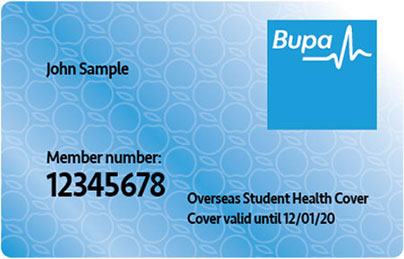
NIB Membership Card:
If you are NIB Policy holder, register on myNIB Account Portal (Online service for NIB)
Once you arrive in Australia, update address and contact details and order the physical membership card or call on NIB 1800 775 204 for the same.
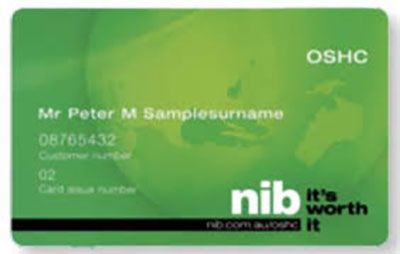
AHM Membership Card:
For Ahm Policy holder, you should open an online membership account and complete registration by updating address details and contact details once you arrive in Australia.
You can activate e Card from your online membership account by choosing “VIEW DIGITAL CARD” option. Save the copy of your card in your phone to keep it handy.
In case you want to order a Physical Membership card, just visit “ORDER DARD” option from your membership account.
OR
Call AHM at 134148 to update your Australian address and contact details to claim the physical card.
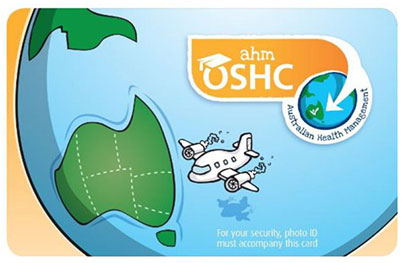
So, these were all the details you need to know about your OSHC membership card.
@GetMyPolicy.Online, you’ll get the most extensive range of Plans from Government Approved Australian Health Insurance Providers. Compare and Choose instantly the plan that suits your needs, care and budget for your student visa for Australia.
In case you need kind of assistance, you can always reach us at-
Call +91 79 6682 6667 (India) | +61 3 9013 0880 (Australia)
Email: support@getmypolicy.online
Your planning to stay or work in Australia is going in a full-fledged manner. You have everything on the table except health insurance. You called your agent to discuss health covers. He comes, fully armed with forms and booklets, and start explaining policies to you from basic to the more complex ones.
And then…. the real struggle starts. You wrestle with tons of information and before you start understanding something, you are forced to weigh the additions or subtraction of each policy.
| More than 70% of overseas workers have trouble understanding what covered in their policy |
| 40% of visitors said they don’t understand changes in their coverage |
| While 50% of policy holders admitted their regrets for the decision on insurance benefits. |
You need to quickly submit evidence of health insurance cover to the immigration policy but, you are here wondering what suits you best or what you need to include in the cover. Right?
Well, there is no denial in that buying an overseas health insurance cover is complicated. Comparing the benefits of different plans, weighing monthly premiums against yearly deductibles make one go insane, especially when you’re short on time.
Must Read: Common Insurance Terms You Should Know: Overseas Health Cover
This is why; we have come up with few tips that can help you evaluate your options and choose the most suitable plan quickly. Take a look!
Choose the Right Category
Any health insurance plan typically consists of four categories: Bronze, Silver, Gold and Platinum and OVHC is no exception. These categories show how the policy holder (you) and the insurance company will share health care costs; however, they do not affect the quality of care.
Let’s understand each category precisely before making any decision.
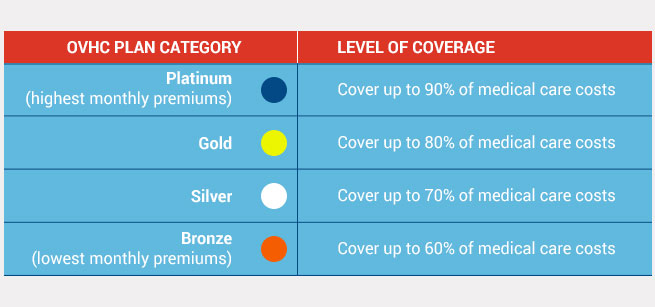
- Bronze: Bronze plans are the basic ones with lowest monthly premiums but the highest costs when you get care. Such plans are recommended if you need few medical services and mostly the protection from bearing full costs at the time of sickness or injury.
- Silver: Silver plans include moderate monthly premiums and moderate costs to get care. The deductibles of this plan are usually lower than those of bronze plans. It covers about 70, 80 or 90 percent of total health care costs, depending on your income.
- Gold: Gold plans have the higher monthly premiums and lower costs when you get care. If you are willing to pay more each month to get your maximum costs covered at the time of medical treatment, gold plans provide great value. Besides, the amount of deductibles you pay before your plan pays are usually low.
- Platinum: Platinum plans come with the highest monthly premiums but the lowest costs when you get care. The deductibles in this plan are very low, means you start reaping its benefits earlier than any of the four categories mentioned above.
Understand Health Care Needs before Costs
You pay monthly premiums, even when you don’t use medical services that particular month. You pay out-of-pocket costs along with deductibles to access care. More often, we tend to overlook our health care needs and shift our entire focus on bills that are required to pay to the insurance company. However, the decision should be made on the basis of health care needs and not just the costs suitable to the pocket.
Compare Health Insurance Plans
It is extremely crucial to learn how each policy of different providers is different in regards to premiums and the services covered. When one has so many policies at hand, it is a common to go with the first few that come in the direction. However, when there is possibility of striking the best deal by comparing different plans, why not make use of it? Resources like www.getmypolicy.online allows you compare plans of leading providers like Allianz Care, Bupa, Nib, Medibank, and AIA to help you choose the one that best meet your budget and visa requirements.

Choosing the right health care coverage is one of the most important decisions you can make for you and your family to ensure a peaceful journey in Australia. You can save a lot of time by constricting the search to those plans that pay for your regular and necessary care. And then consider premiums and out-of-pocket expenses on the basis of budget and assets.
Let’s start our blog with Mike’s story. Mike is a student of a popular college in Australia. Like other students, he goes to college, studies, does extra-curricular activities, plays sports etc. As life is not always a bed of roses, for everyone – no matter how strong we are, tend to feel under the weather sometimes. Such was the case with Mike one day.
Come to rescue, the Overseas Students Health Insurance.

Insurance for a disease! One may tend to think “What’s there in a disease?”
A private bed in Australian Hospitals could cost anywhere between $250-$600, in addition to doctor’s fees, prescription medicines, services etc. This could run into financial troubles; something which can be avoided with an OSHC plan.
Mike’s planning to follow and adhere to the health norms of Department of Home Affairs came to his rescue. The Department of Home Affairs states, according to condition 8501 of the student visa (subclass 500) states that “The visa holder must maintain adequate arrangements for health insurance during their stay in Australia.”
But hey, why is it necessary for an overseas student to have an OSHC Insurance in Australia?
Like Mike, not all overseas students in Australia are eligible for Medicare, Australia’s health care system that offers a range of medical services for free or at a lower cost. Also, paying for emergency medical services can prove to be really costly in Australia. This is when an overseas health insurance comes to your rescue. It provides an access to free and/or affordable medical systems, in case of an unfortunate event.
An OSHC Cover (Overseas Students Health Insurance) is a health coverage specifically designed to help international students cover the costs of medical and hospital care for the duration of stay in Australia.
Must Read: Make your stay at Australia a Pocket-friendly one with an Overseas Health Insurance Cover
With an Overseas Students Health Cover, international students are covered for:
- Hospital costs for treatment and accommodation
- Out-of-hospital medical services
- Ambulance services
- 100% of MBS fee for any in-patient services like surgery or extended care for an illness
- Public and private shared ward accommodation (only those private hospitals that are associated with OSHC insurance provider)
- A couple of Prosthetic devices
- Listed prescription medicines, mentioned and approved by the doctor
In some cases, depending upon the insurer, dental services, physiotherapy and chiropractic services and contact lenses and eye glass prescriptions are not covered – but then depending upon the insurer, it differs. Not to worry though, extra packages can always be bought for a small fee.
If one is riddled with thoughts on how to get a health policy, GetMyPolicy comes to your rescue! It’s important to know that the OSHC is mandatory for the entire duration of stay in Australia. However, due to a wide array of insurance policies available, it can prove to be quite tough and overwhelming to buy the best suitable OSHC. It is always advisable to compare health insurance plans to make sure you are covered for all medical contingencies.
The process is actually, quite simple. One starts with finding a clinic or a medical centre on the internet, and it is followed by making an appointment with a General Practitioner (GP). OSHC providers run the extra mile in offering members access to the doctor directly, via social media or phone. With some OSHC providers, one can consult a doctor 24×7 in the comforts of their home. If the problems appear out of bounds for the GP, one is referred to a specialist.
Okay, so from where to buy the OSHC? Who are the best insurers?
The Top leading health insurance providers of OSHC Student Health Cover are
Confused by the options? Hey, we at GetMyPolicy are here to help you! In here, you can compare various health insurance plans and chose the one best for you or your type of visa. Here, you can get specific insights on coverage patterns when it comes to Public and Private hospital treatments.
At GetMyPolicy.online, you’ll get the most extensive range of Plans from Government Approved Australian Health Insurance Providers. Compare and Choose instantly the plan that suits your needs, care and budget for your student visa for Australia.
To make a claim, if the concerned medical centre is a part of direct billing network of the insurance provider, one doesn’t have to pay for anything. The claims can be done in person, online or by post.
Must Read: 6 Common Mistakes to Avoid While Buying an Overseas Health Insurance Policy
Australia & high medical costs are synonymous, aren’t they? Don’t agree? Maybe you consider pairing up Australia with kangaroos & tourists. This was precisely what Natasha thought when she planned her first solo trip to Australia. However, after getting back, she was thanking one thing: OVHC Health Insurance.
Read Natasha’s curious case to find out!
Working in the I.T. sector can be cumbersome for many, and a break from the routine work schedule can help on calm a person’s mind and get it back on the right track. And where better to enjoy one’s time off than the time spent in the Land Down Under!
So, Natasha starts with planning her trip, thinking of places to visit and activities to do! Well, her itinerary includes diving at the Great Barrier Reef, surfing at the Gold Coast, watching the sunset over the Yarra River, watching the Sydney Opera House while cruising at night, living nature and wildlife at Cape Byron Headland, etc. among many. The visits are not all; she plans to indulge herself in excellent food & cuisine Australia has to offer and live every bit of her Australian Dream.
Sounds fantastic, doesn’t it? There’s a good thing coming up! Wait for it!
But one of her close friends, Vikas asks her to get an OVHC Health Cover before leaving to Australia. Insurance before travelling? Well, that’s just recommended by the Department of Home Affairs, Australia; it isn’t compulsory, so why ‘waste’ money on that? Well, after an hour or two of deliberation, Vikas, manages to convince her to have a decent level of OVHC before starting her weeklong trip to Australia.
Well, after a healthy & a great start to her trip, the combination of too much adventure, Chicken parmigiana & Ginger beer didn’t help her much, and she soon found her way to a hospital, instead of surfing at the Gold Coast as planned.

The recovery process wasn’t simple. In addition to the General Practitioner services, she had to avail the services of a Specialist, all thanks to her severe Gastric problem. Look deeper, and you’ll soon realize that she would have needed to pay for hospitalization, an ambulance from her place of stay, medications provided in – hospital, and most importantly, pharmacy expenses when she’d be discharged.
Well, the total treatment expenses came slightly over 1800 AU$. The prescribed pharma drugs were an extra 120 AU$. For a solo traveller, who came to enjoy her time, to eliminate her stress, the very sight of approximately 2000 AU$ was a shocker.
Remember her friend Vikas’ advice to buy a suitable OVHC health plan from a certified provider? Well, this ‘waste’ costing 150 AU$ covered her 2000 AU$. Yes, indeed! Natasha’s OVHC provider covered her for in – patient accommodation in their vast network of hospitals, hospital transport, fees for medical personnel, nursing care, hospital meals, and lots more!
Now comes the best part – Claiming the medical expenses incurred. The hospital expenses were taken care of in a week. Thanks to her friends’ advice, Natasha did not have to shell out a single dollar from her pocket towards medical expenses or face any unwanted hassles during the claim processes. All thanks to the perfect OVHC health insurance provider.
Read More: Make your Australian Visit Medical Bills Free with Overseas Visitor Health Insurance!
All hail Natasha for sharing her story with us. Like many, she aims to bust this myth of side-lining OVHC during a trip. As travellers, would we expect something so unfortunate like this? We can see, but not foresee! The crux: It’s always good to be prepared. Better safe than sorry.
To secure your wallet and your travel health, buy the best OVHC health insurance. Compare various features and buy your best policy instantly at GetMyPolicy. Make your best choice from various options that align perfectly with your needs.
Australia is a beautiful place to live in and expensive as well, especially when it comes to bear any medical expenses. So, do you know, how the medical system works in the land of Kangaroos?
How medical system works?
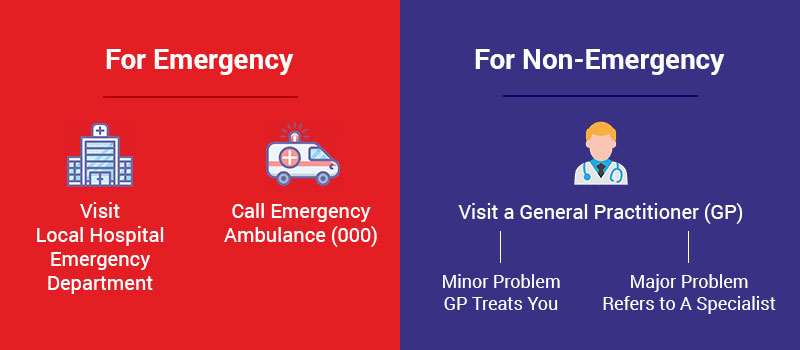
What to do when someone needs to visit a hospital?
There are two types of service in Australia
- Public hospital
- Private Hospital
Difference between Public and Private Hospital
Generally, services under Public hospital are almost free of cost under Medicare! There are some restrictions for RHCA citizens which are mentioned below! You cannot choose your doctor!
In case of choosing a private hospital, you can pick your doctor. But one must check with the Overseas Health Insurance Cover provider whether that private hospital is listed under their service. If yes, you can enjoy the benefits. Otherwise, you won’t be covered! For more information about the service provider, you can check GetMyPolicy.online.
You can also log on to your service provider’s website and check ‘Find My Doctor’ option to avoid any extra costs!
What is Medicare in Australia?
Medicare is Australia’s public health care system for the citizens and residents under RHCA. Medicare offers free and subsidised cover for some services. If an international visitor faces any medical emergency, she/he may receive the benefits of Medicare! Though Medicare does not cover the expenses of a private hospital! you may not have the right to choose your own doctor in a public hospital as well! For every out of pocket expenses, you need to pay!
What is RHCA (Reciprocal Health Care Agreement)?
Australia has a Reciprocal Health Care Agreement with countries like UK, Belgium, Italy, New Zealand, Malta, Slovenia, Sweden, Ireland, Finland, Norway. The Medicare system in Australia will benefit any citizen of these countries! They generally do not need to purchase any Overseas Health Insurance Cover unless they want to a full cover because there are some services which are not covered by Medicare! Citizens who includes under RHCA, cannot choose their doctor or preferred hospital. Sometimes, they may have to wait a long period before undergoing treatment. Read More…..
What is EXTRA COVER?
Even an overseas health insurance coverage does not cover everything! In Medicare, Ambulance services, private doctor access, private hospital cost are not covered. Similarly, Overseas Student Health Cover (OSHC) and Overseas Visitor Health Cover (OVHC) do not cover dental, skin, cancer and some other services! So, insurance providers offer Extra Cover facility. You need to buy an extra cover to avail of these services!
To live care freely and soak the beauties of Australia, one must buy an adequate Overseas Health Insurance Cover for them and do not forget to upgrade your policy whenever needed! All we can say is that never take your health as granted!
Get in Touch with us for any queries, mail us at support@getmypolicy.online or call us at Australia – +61 3 9013 0880, India – 079 6682 6667

 AUS
Australia
AUS
Australia
 IND
India
IND
India
 UAE
UAE
UAE
UAE
 CA
Canada
CA
Canada
 SL
Srilanka
SL
Srilanka
